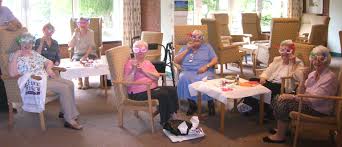How to help seniors and disabled adults socialize despite their limitations

As people age, or in the case of disabled adults, they may have physical or cognitive limitations that make socializing difficult. However, socializing is an important part of emotional and mental well-being. Seniors and disabled adults should not be isolated just because of their limitations. There are ways to help them socialize despite their shortcomings. In this article, we will discuss some strategies for helping seniors and disabled adults socialize.
- Make the effort to be inclusive: When planning events, parties or outings, it’s important to be inclusive. Think of ways to include seniors and disabled adults in the activities. This can include wheelchair accessible locations, planning events around specific dietary needs or finding a location where everyone can comfortably participate.
- Make use of technology: Technology has made it easier than ever to stay connected with loved ones. Seniors and disabled adults who live far away from family members or friends can still stay connected through video conferencing, social media or messaging apps. Teach seniors how to use these technologies, and they can feel more connected to people who are important to them.
- Participate in social activities: Seniors and disabled adults can participate in social activities that are tailored to their interests, such as hobby classes, cultural events, and charity events. These types of social activities can allow for meaningful interaction with other people who share similar interests, which can foster social connections.
- Encourage volunteering: Research has shown that volunteering can provide a sense of purpose and boost self-esteem. Encourage seniors and disabled adults to volunteer their time and skills to organizations that they believe in. Volunteering can be a great way to meet new people and form social connections within the community.
- Offer transportation assistance: Many seniors and disabled adults have physical limitations that make it difficult to get around. Consider offering transportation assistance, such as a ride to social events or appointments. This can help seniors and disabled adults feel less isolated and more connected to the community.
- Create a safe and comfortable space: When socializing with seniors and disabled adults, it’s important to ensure that the space is safe and comfortable. For example, if a senior has mobility issues, ensure that there is ample space to navigate. If someone has hearing difficulties, create an environment with minimal background noise. When someone feels safe and comfortable, they are more likely to engage socially.
- Practice active listening: When engaging in conversation with seniors and disabled adults, it’s essential to practice active listening. Listen attentively to their stories and concerns, and provide positive feedback and support. This builds trust and can encourage individuals to open up and feel more comfortable in social situations.
In conclusion, it’s important to help seniors and disabled adults socialize despite their limitations. By creating inclusive environments, using technology, encouraging social activities and volunteering, offering transportation assistance, creating safe and comfortable spaces, and practicing active listening, we can help seniors and disabled adults feel more connected and less isolated. Socialization is a vital component of emotional and mental well-being and should be encouraged for individuals of all ages and abilities.
For more information, about in home personal care, for seniors and disabled adults. Call Jamhuri Healthcare Services Inc. 1-800-547-2851 or visit us on the web: www.jamhuricares.com
We are licensed as a residential service agency by the Maryland Department of Health and Mental Hygiene – Office of Health Care Quality, since 2004